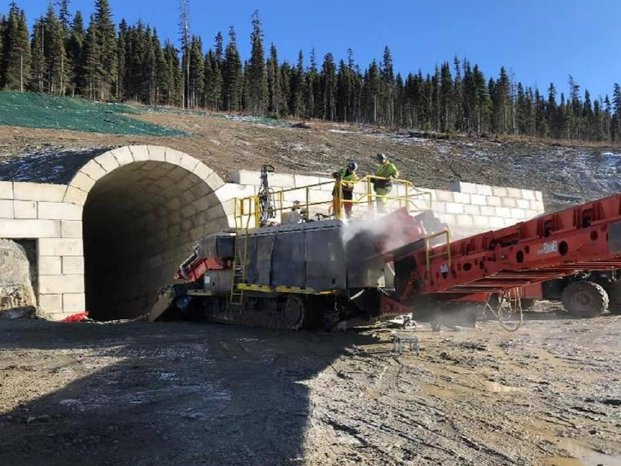It is known that gold clumps into quartz with the help of earthquakes. More details are now known.
After decades of research, geologists have now solved the mystery of how erosion and seismic waves form large nuggets. Gold nuggets are formed in cracks in the rock, in so-called quartz veins. These are filled with mineral-rich hydrothermal fluids from the depths of the earth's crust. The gold nuggets then float in these fluids. Although gold is constantly precipitating in quartz, the formation of the very large nuggets was previously unknown.
Incidentally, the large nuggets account for up to 75 percent of all the gold ever mined. Two clues helped the geologists. Firstly, the nuggets occur in orogenic gold deposits. These are deposits that form during earthquakes. And secondly, quartz is a material that generates its own electrical charge in response to geological stresses. Now the following happens: Earthquakes fracture rock and force hydrothermal fluids into the quartz veins, filling them with dissolved gold. The quartz veins generate an electrical charge, which reacts with the gold, causing the gold to solidify.
Dissolved gold is preferentially deposited on existing gold grains. Gold thus solidifies into clusters that grow with every earthquake. Some gold nuggets can weigh 60 kilograms. By testing this in the laboratory, the geologists and researchers were able to confirm their theories. Crystals were immersed in a gold-bearing liquid and seismic waves were imitated. This proved that quartz can generate a voltage under geological stress to precipitate gold. It is becoming difficult for investors to find gold nuggets. It is easier to invest in well-positioned gold companies.
Osisko Development - https://www.commodity-tv.com/ondemand/companies/profil/osisko-development-corp/ - has its sights set on previously producing gold projects in the USA, Canada and Mexico. The company aims to become a medium-sized gold producer.
Vizsla Silver - https://www.commodity-tv.com/ondemand/companies/profil/vizsla-silver-corp/ - is focusing on its Panuco project in Mexico, which contains gold and silver. The gold and silver grades from the drilling are extremely encouraging (almost 3,700 grams of silver and more than 41 grams of gold per tonne of rock, for example).
Current company information and press releases from Vizsla Silver (- https://www.resource-capital.ch/en/companies/vizsla-silver-corp/ -) and Osisko Development (- https://www.resource-capital.ch/en/companies/osisko-development-corp/ -).
In accordance with §34 WpHG I would like to point out that partners, authors and employees may hold shares in the respective companies addressed and thus a possible conflict of interest exists. No guarantee for the translation into English. Only the German version of this news is valid.
Disclaimer: The information provided does not represent any form of recommendation or advice. Express reference is made to the risks in securities trading. No liability can be accepted for any damage arising from the use of this blog. I would like to point out that shares and especially warrant investments are always associated with risk. The total loss of the invested capital cannot be excluded. All information and sources are carefully researched. However, no guarantee is given for the correctness of all contents. Despite the greatest care, I expressly reserve the right to make errors, especially with regard to figures and prices. The information contained herein is taken from sources believed to be reliable, but in no way claims to be accurate or complete. Due to court decisions, the contents of linked external sites are also co-responsible (e.g. Landgericht Hamburg, in the decision of 12.05.1998 - 312 O 85/98), as long as there is no explicit dissociation from them. Despite careful control of the content, I do not assume liability for the content of linked external pages. The respective operators are exclusively responsible for their content. The disclaimer of Swiss Resource Capital AG also applies: https://www.resource-capital.ch/en/disclaimer/


